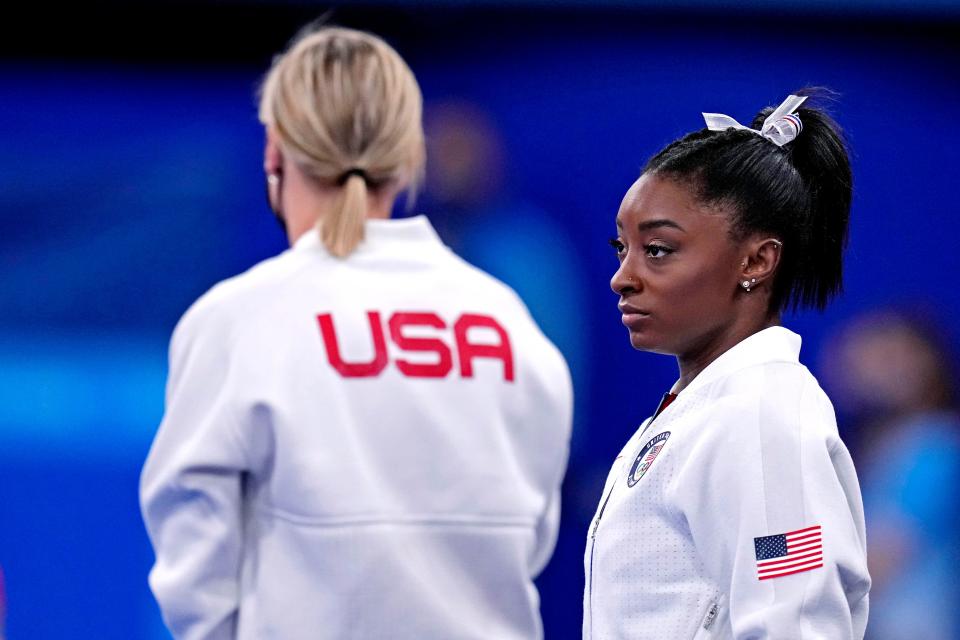Simone Biles gave hints of struggles well before Tokyo Olympics withdrawals
TOKYO — Looking back, the signs were there for a while.
There was the Instagram post the day before team final Tuesday, when Simone Biles talked of feeling the “weight of the world” on her shoulders. The tears that followed a rough performance at the Olympic trials. The persistent rage at USA Gymnastics and the frustration that she could not separate herself from the federation that failed her.
Even last year, her despair at the news the Tokyo Olympics were being delayed.
“It’s hard. Mentally I was kind of emptying my gas tank,” Biles told USA TODAY Sports in April 2020. “I was ready to go in three months and ready to be done. That’s what I was striving for. So now we have to take our foot off the gas. 'Whoa, whoa, wait! Not three months, now it’s going to be 15.'
“For a lot of us athletes,” Biles said then, “that’s a big adjustment.”
Biles’ decision Tuesday night to withdraw from the team final after one event – and Wednesday's announcement that she will not compete in the all-around final – because she was struggling with mental health issues might have been shocking in the moment. We have become so spoiled by her gravity-defying skills and metronome-like consistency that she has become this superhuman caricature.
But she has emotions and frailties just like the rest of us. What initially was written off as a bad day or her needing to blow off steam might actually have been warning bells. And they built to a point where competing simply became impossible.

“Therapy has helped a lot, as well as medication. And I feel like that's all been going really well,” Biles said Tuesday night. “But then whenever you get a high-stress situation, you kind of freak out. You don't really know how to handle all of those emotions, especially being here at the Olympic Games.”
Anxiety is not a new phenomenon for Biles. She told Olympics.com in early 2020 that she was “having breakdowns,” and that, a year earlier, “I forgot how to twist and flip.” She had similar troubles in the leadup to the Rio Olympics in 2016.
The intense glare of the Tokyo spotlight has only exacerbated the issue.
Biles has been open about her struggles with mental health. She is a sexual abuse survivor, one of the hundreds of girls and young women abused by longtime USA Gymnastics physician Larry Nassar, and having to interact with USA Gymnastics is a constant trigger.
At the Olympic trials, after a fall off balance beam and out of bounds on floor exercise left her behind Suni Lee on the second day, Biles mentioned how drained she was.
“There’s just a lot more emotions going into it because of everything I've been through. And it's been a long journey,” she said. “So I'm just excited to continue and wrap that up.”
She is also the greatest gymnast her sport has ever seen, with more medals at the world championships than any other athlete, male or female. But the burden of the expectations on her can be crushing.
Much as she wanted these Tokyo Olympics to be for her, to have the enjoyable experience she did not in Rio, that became impossible. She is the face of these Olympics now that Michael Phelps and Usain Bolt are retired, a ubiquitous presence in commercials and NBC’s coverage.
At times, she has embraced her star turn. Her leotards at the U.S. Classic in May and the national championships in June, for example, featured the bedazzled outline of a goat. But there comes a point when what seemed light and fun begins to feel like a runaway train.
“I came in and felt I was still doing it for other people,” Biles said Tuesday. “So that just hurts my heart that doing what I love has been kind of taken away from me, to please other people.”
COVID-19, and the protocols that are in place to keep the Tokyo Games from being a superspreader event, have made these an Olympics like no other.
Families of the athletes are not allowed, and the time difference – Tokyo is 14 hours ahead of Houston, Biles’ hometown – can make them feel even further away. The gymnasts opted not to stay in the Olympic Village and are instead at a hotel near the Ariake Gymnastics Center. While that might reduce their risk of exposure to COVID, it has increased the feeling of isolation and the anxiety Biles was already feeling.
“Everyone please pray for my sister. … She really needs them at this time, and is having a hard time,” her older brother, Ron, said in an Instagram post Tuesday night. “You’re still the GOAT (Simone) and no one can ever take that away from you.!! You’re an amazing woman, talented gymnast, and I know you can bounce from this. We all love you Simone and your family is right here behind you sis. I pray you get through this hurdle and end your LEGACY at these Olympic Games as you envision.”
These Olympics are not going the way anyone envisioned for Biles. Looking back, however, maybe we should have seen it coming.
Follow USA TODAY Sports columnist Nancy Armour on Twitter @nrarmour.
This article originally appeared on USA TODAY: Simone Biles: Struggles foreshadowed well before Tokyo Olympics

